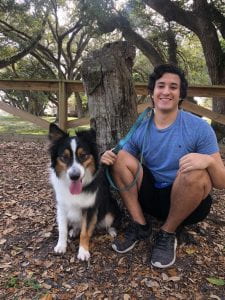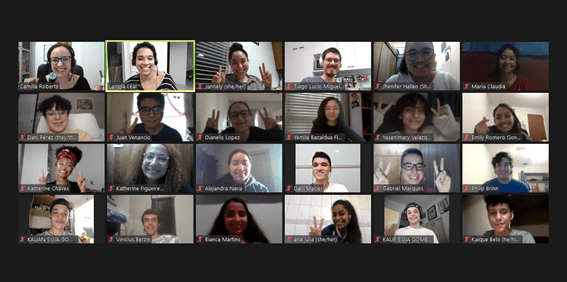
About the Author
Philip Brinn is a sophomore at Harvard College studying Molecular and Cellular Biology. He was born in Brazil and grew up in South Florida. He plans on pursuing a citation in Portuguese and a career in medicine. On campus, he is a part of CrimsonEMS, Harvard’s student-run emergency medical services (EMS) organization and the Harvard Premedical Society’s Surgery Interest Group committee.
MLAB Mentoring:
A Weirdly Nostalgic Experience
As an MLAB mentor, I’ve had the opportunity to engage with Brazilian high school students and help them develop skills that they will hopefully keep using throughout their education. I first heard about MLAB, Harvard’s Mentoring and Language Acquisition in Brazil, from one of my Peer Advising Fellows last year. I had asked about potential volunteering experience and had told her about my desire to travel to Brazil. She described it as the opportunity to visit Brazil for a few weeks while mentoring underprivileged youth in São Paulo. The in-person aspect of the program was unfortunately scrapped due to the pandemic, but it continued this year as a remote program from my bedroom in South Florida.
As a Brazilian native, MLAB felt like the perfect opportunity to give back to the community that I came from. The youth we mentor are low-income high school-age students who have scholarships to private schools in São Paulo. Typically, each mentee is assigned to a mentor, although this year, we ran short on mentors, so each Harvard mentor was often assigned two mentees. We meet with our mentees for at least an hour a week to chat and work on their English language and communication skills, although we have group meetings every month so that everyone in the program gets a chance to know each other.
Meeting with my mentee, Humberto, is weirdly nostalgic. The Brazilian school system is organized a bit differently than that of the United States, but he’s essentially a freshman in high school.
Since Humberto is interested in attending college in the United States, I got to relive the experience of researching universities with him and thinking about what to do post-high school graduation. One day, we talked about how different the food is between Florida and Brazil, and I got to teach him about conch fritters and what alligator tastes like, although I’m not sure he’s over how strange conchs look while they’re still alive. In addition to sharing bits of our lives with one another, many of our meetings have consisted of activities that serve to improve Humberto’s English and test-taking abilities. Although our conversations certainly helped him practice English, at his request, I helped Humberto review a couple of TOEFL exams, which are the premier English-language test for university study, work, and immigration.
One of MLAB’s purposes is to provide mentees with the skills to prosper in future academic settings. By coincidence, Humberto and I share the inability to remember what we have to do without writing it down somewhere. This problem is only exacerbated by the fact that we’ve both been forced to participate in online schooling, but since we’re both stuck in the same situation, we’ve had several productive conversations about what works for us. Since I’ve been able to solve this problem personally through the use of Google Calendar, I was able to share with him my strategies for staying on task. We’ve had talks about goal-setting and how to make sure schoolwork never becomes overwhelming.
Overall, MLAB has been both an educational and enjoyable experience. It has provided me with the ability to experience reconnect with my heritage and use my own acquired knowledge in order to help someone else. I would recommend the program to anyone who wants to learn more about Brazilian culture, especially since, in future years, MLAB should, hopefully, be able to reinstate itself as an in-person program and provide its mentors the opportunity to immerse themselves in the city of São Paulo.
More Student Views
Puerto Rico’s Act 60: More Than Economics, a Human Rights Issue
For my senior research analysis project, I chose to examine Puerto Rico’s Act 60 policy. To gain a personal perspective on its impact, I interviewed Nyia Chusan, a Puerto Rican graduate student at Virginia Commonwealth University, who shared her experiences of how gentrification has changed her island:
Beyond Presence: Building Kichwa Community at Harvard
I recently had the pleasure of reuniting with Américo Mendoza-Mori, current assistant professor at St Olaf’s College, at my current institution and alma mater, the University of Wisconsin-Madison. Professor Mendoza-Mori, who was invited to Madison by the university’s Latin American, Caribbean, and Iberian Studies Program, shared how Indigenous languages and knowledges can reshape the ways universities teach, research and engage with communities, both local and abroad.
Of Salamanders and Spirits
I probably could’ve chosen a better day to visit the CIIDIR-IPN for the first time. It was the last week of September and the city had come to a full stop. Citizens barricaded the streets with tarps and plastic chairs, and protest banners covered the walls of the Edificio de Gobierno del Estado de Oaxaca, all demanding fair wages for the state’s educators. It was my first (but certainly not my last) encounter with the fierce political activism that Oaxaca is known for.





